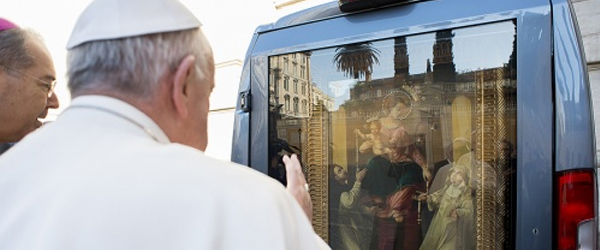In her most recent book, a series of essays entitled, “When I was a Child I Read Books,” Marilynne Robinson includes an essay called “Wondrous Love.” She begins the essay autobiographically, confessing her deep, long-standing faith as a Christian and her ever-deepening wonder and awe at the mystery of God. She goes on to express some of her fears apposite to what is happening today in many of the churches and inside many of us. Namely, new forms of tribalism and fear are reducing our wondrous God to a "tribal deity" and our own "local Baal.” The God of all nations, all families, and all peoples, she asserts, is too frequently being invoked by us as a God, more exclusively, of my own nation, my own family, my own church, and my own people. She cites various examples of this, including her own sadness at how sincere Christians cannot accept each other's authenticity: “I must assume that those who disagree with my understanding of Christianity are Christians all the same, that we are members of one household. I confess that from time to time I find this difficult. This difficulty is owed in part to the fact that I have reason to believe they would not extend this courtesy to me." This, she rightly asserts, is unworthy of God, of Christianity, and of what's best in us. We know better, though we usually don't act on that and are thus indicted by what Freud called "the narcissism of minor differences." And this takes its root in fear, fear of many things. Not least among those fears is our fear of the secularized world and how we feel this has put us on a slippery slope in terms of our Christian heritage and our moral values. To quote Robinson here: "These people see the onrush of secularism intent on driving religion to the margins, maybe over the edge, and for the sake of Christianity they want to enlist society itself in its defense. They want politicians to make statements of faith, and when merchants hang their seasonal signs and banners they want them to say something more specific than ‘Happy Holidays.’”
Fear and antagonism are very fashionable within religious circles today, almost to be worn as a badge of faith and loyalty. And is this a sign of health? No.
Robinson, however, is distrustful of enlisting political power to defend Christianity. Why? Because "this country [the United States] in its early period was largely populated by religious people escaping religious persecution at the hands of state churches, whether French Huguenots, Scots Presbyterians, English Congregationalists, or English Catholics." She adds: "Since my own religious heroes tended to die gruesomely under these regimes, I have no nostalgia for the world before secularism, nor would many of these ‘Christian nation’ exponents, if they looked a little into the history of their own traditions." Inside our fear of secularism, she suggests, lies a great irony: We are afraid of secularism because we have, in fact, internalized the great prejudice against Christianity, namely, the belief that faith and Christianity cannot withstand the scrutiny of an intellectually sophisticated culture. And that fear lies at the root of an anti-intellectualism that is very prominent inside many religious and church circles today. How much of our fear today about Christianity being on a slippery slope can be traced back to this prejudice? Why are we so afraid of our world and of secularized intellectuals? This fear, she asserts, spawns an antagonism that is unworthy of Christianity. Fear and antagonism are very fashionable within religious circles today, almost to be worn as a badge of faith and loyalty. And is this a sign of health? No. Neither fear nor antagonism, she submits, are "becoming in Christians or in the least degree likely to inspire thinking or action of the kind that deserves to be called Christian." Moreover, "if belief in Christ is necessary to attaining of everlasting life, then it behooves anyone who calls himself or herself a Christian, any institution that calls itself a church, to bring credit to the faith, at very least not to embarrass or disgrace it. Making God a tribal deity, our local Baal, is embarrassing and disgraceful." Fear and antagonism do nothing, she adds, to draw respect to Christianity and our churches. And to the extent that we let them be associated with Christianity, we risk defacing Christianity in the world's eyes. But saying that in today's climate is to be judged as unpatriotic. We are not supposed to care what the world thinks. But it is the world we are trying to convert. And so we need to be careful not to present Christianity as undignified, xenophobic and unworthy of our wondrous, all-embracing God. Why all this fear, if we believe that Christianity is the deepest of all truth and believe that Christ will be with us to the end of time? Her last sentences capsulize a challenge we urgently need today: "Christianity is too great a narrative to be reduced to serving any parochial interest or to be underwritten by any lesser tale. Reverence should forbid in particular its being subordinated to tribalism, resentment or fear.” Oblate of Mary Immaculate Father Ronald Rolheiser is a specialist in the field of spirituality and systematic theology. His website is www.ronrolheiser.com.

